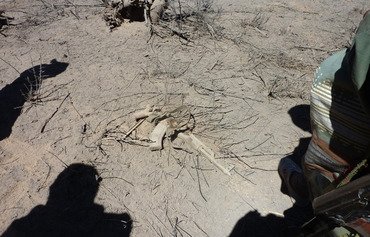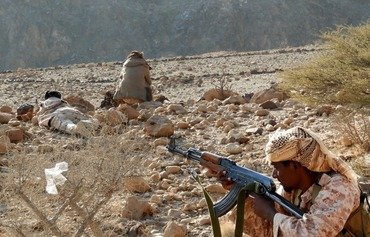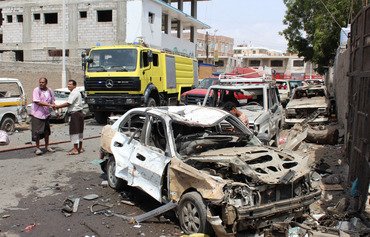The tribes of Yemen's al-Bayda province have pledged to fight extremist groups and protect their areas against any al-Qaeda or "Islamic State of Iraq and Syria" (ISIS) activity, local officials tell Al-Mashareq.
The tribes vowed to ostracise any member proven to have collaborated or joined these groups, pledging to disown them and lift the tribe’s protection from them, said al-Bayda province governor Sheikh Ali Mohammed al-Mansouri.
"Al-Bayda tribes agreed to protect their areas and keep the directorates and cities of the province out of the conflicts," he told Al-Mashareq.
In early April, local media reported that ISIS had published photographs of fighters training at the Abu Muhammad al-Furqan camp in al-Bayda.
"These camps are located on the edges of the province in areas adjacent to Mareb province," he said, noting that they receive support in the form of weapons and fighters from Mareb, which is only one hour away.
ISIS has not expanded its presence beyond those camps, he said, because the nearby tribes are the Qayfa tribes that are hostile to ISIS, as well as the tribes of Al Ghneim, Mahal Yazeed and Weld Rabih that have pledged to protect their areas from ISIS and al-Qaeda.
ISIS has camps in a number of areas in al-Bayda province, he said, including "in Yakla, al-Naqaa, al-Arrar and Zaaj".
These areas are uninhabited, except for Yakla, which is inhabited by a small number of Bedouins, al-Mansouri said.
Tribes ready to fight
Security agencies are monitoring the movements of extremist groups, al-Mansouri said, "and will act at the right time, with the co-operation of the tribesmen, who reject the presence of such elements in their areas".
"The tribes are able to protect their lands and stop any advance by [extremist] groups," political affairs researcher Adnan al-Humairi told Al-Mashareq.
"ISIS camps are located on the border between al-Bayda and Mareb and in uninhabited areas," he said, noting that the army has not broken them up as it is preoccupied with the war and does not want to open a new front.
If these extremist elements try to make any move or expand geographically, however, the tribes and the army will move against them, he said.
Meanwhile, the rivalry between ISIS and al-Qaeda for control over certain areas is growing, he said.
ISIS believes it is in its ascendancy, while al-Qaeda is in decline, he said, and this has pitted the two groups against each other in a battle for control over certain areas.
It is likely that ISIS will seek to make inroads in Radaa directorate in the future, he said, because of its strategic location near the border of several provinces.
Al-Humairi warned against a protracted war in Yemen, saying it "gives extremist elements and their groups -- ISIS in particular -- an opportunity to expand".
Need to end the war
The absence of the central authority of the state leaves parts of Yemen vulnerable to occupation by ISIS and other extremists, political analyst Tareq al-Zuraiqi told Al-Mashareq.
This is especially the case in the areas where fighting is ongoing between provinces controlled by the Yemeni government and those controlled by the Iran-backed Houthis (Ansarallah), including al-Bayda province, he said.
"The Yemeni tribe, by virtue of its power and control over its regions, is capable of curtailing the spread of ISIS and al-Qaeda," al-Zuraiqi said.
But the danger these extremist groups pose extends well beyond Yemen, he added, calling on the Arab coalition to actively target their camps.
Meanwhile, he said, the failure of all parties to the conflict to successfully resolve it has provided ISIS with climate that is conducive for the establishment of training camps and potential geographical expansion.
As Yemen's war drags on, he said, ISIS has been quietly establishing military positions and preparing to launch surprise attacks on cities, as has happened in the Iraqi city of Mosul.
"The danger of ISIL’s spread and expansion threatens the security and stability of not only Yemen but the entire region as well," he said.

![A Yemeni tank is transported through al-Bayda province on May 18th, 2014. Yemeni tribes in the area say they reject the presence of the 'Islamic State of Iraq and Syria' and al-Qaeda. [AFP PHOTO/STR]](/cnmi_am/images/2017/05/04/7800-Yemen-Bayda-terrorism-600_384.jpg)






